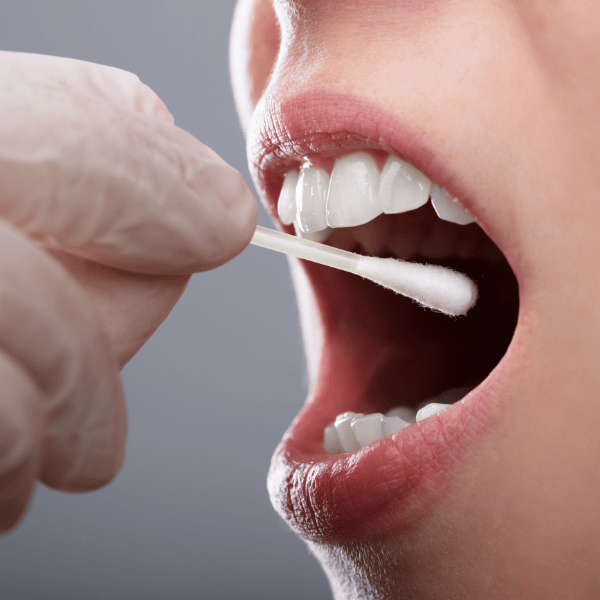Oral Fluids Testing: What You Need to Know
August 2, 2023
Last updated July 27, 2023
Key take aways:
- Oral fluid specimens will be required in some instances
- Oral fluid has a shorter detection window than traditional urine samples
- Standing orders needed for employers to continue efficient screening processes
- You can’t use DOT-compliant oral fluid screening yet; what we’re still waiting on
- How to be as ready as you can be for oral fluid drug testing
On May 2, 2023, the US Department of Transportation (DOT) released a final rule, adding oral fluids (saliva) to the list of specimens an employee or prospective employee can produce for the purposes of DOT-compliant drug testing.
Even though the rule went into effect June 1, 2023, employers cannot yet implement a DOT-compliant screening program that includes oral fluids. Here are four reasons why:
- DOT must first publish a list of which collection devices (swabs, tubes, etc) meet the requirements for specimen collection;
- At least two US-based laboratories must be certified to run oral fluid testing and validate the DOT-approved devices;
- Collectors at collection sites across the country must be trained and qualified on each DOT-approved device;
- Adequate inventory of DOT-approved devices must be provided to collection sites, mobile collectors and employers who self-collect to complete necessary specimen collections.
As of the date of publication of this blog, none of these four steps have been completed.
Considerations around oral fluid usage
There is no question that the addition of oral fluid testing is a positive step towards improving safety in the transportation industry. It provides employers with a choice of drug testing methodology that is less invasive and less susceptible to cheating.
However, employers need to know that the window of detection (the period of time in which a drug test will return a positive result after the donor has consumed a substance) is shorter than a urine specimen, but also starts earlier. For example, if someone used a prohibited drug shortly before being screened, their urine sample might still return a negative result, while an oral fluid sample would likely return a positive result. Conversely, an oral fluid specimen collected weeks after they used the drug may test negative, while a urine specimen would still test positive for up to a month after consumption.
All specimen types have trade-offs. For example, hair specimens have the longest detection window, ranging into multiple months of detection, but a hair specimen won’t show a positive result until several weeks after the substance was ingested. Conversely, blood specimens can detect substances very shortly after use but are more complex and uncomfortable to obtain.
Oral Fluid Specimens Required for Certain Populations
New DOT rules require an oral fluid collection for any direct observed collections of transgender or non-binary individuals. This will require every DOT-regulated employer to have oral fluid specimen collection amended into their current collection site, third-party administrator (TPA) or lab contract to ensure compliance with the law.
Non-DOT Oral Fluid Screening
Oral fluid screening has been available to employers for years and can be used right now for employee populations that are not subject to DOT agency regulations. For example, the CEO, accountant and administrative assistant at a trucking company are likely not DOT-regulated roles. If company policy allows, new hires could receive virtual or in person oral fluid screening prior to employment.
Vault offers both virtual and in-person oral fluid collection services to its clients for non-DOT screening. (When available, Vault will offer nationwide DOT-compliant oral fluid screening and all DOT-screening will be in-person only, consistent with published regulations.)
Preparing for Oral Fluids in Your Screening Program
Standing Orders: The employer is responsible for determining what type of specimen should be collected and when an alternative type should be collected. Having standing orders in place makes the screening process simpler and faster for your employees. Additionally, new DOT regulations will require Designated Employer Representative to communicate to service providers when oral fluid and other alternative specimen types should be collected instead of urine. Employers should prepare to provide third party administrators with standing orders on what specimen type should be collected by (1) test reason, (2) when a direct observation is required, and (3) when a shy bladder or dry mouth occurs.
Company Policy Updates: Standing orders consistent with regulations should also match your company policies. For example, do you want your non-DOT employee population to have the exact same screening experience as your DOT-regulated population? Would you prefer to use an expanded panel to test for more illegal substances than DOT requires? Will your random testing program be expanded to include more variety in specimen types?
If you need help with your standing orders and policy updates, Vault provides these compliance services to its clients. Reach out.
Training: If you have trained employees to collect specimens from your workforce today and wish to continue the practice, your collectors will need to be trained to follow the new oral fluid process and guidelines. Training opportunities will be available through Vault when DOT-approved devices become available.
Laboratories: Because DOT only has to approve two laboratories initially, your typical lab partner may not be approved to test oral fluids initially. To ensure you can use oral fluids as you intend and in some cases, as required by DOT, reach out to your TPA to ensure your contract includes pricing and access to multiple laboratories and that your lab accounts with each company are set up and active, even if they’re infrequently used. Laboratory testing accounts can take weeks to set up – don't be last in line when the time arrives!
Need to make changes to your Vault account and Drug testing program procedures? We are here to help with your pre - employment and post - accident testing. Reach out to your account manager at acctmgr@vaulthealth.com
Time for a new TPA? Contact our sales team for information on how to partner with Vault at sales@vaulthealth.com
Stay updated with the latest news
Join Vault’s AI-generated transportation newsletter here [link] to follow transportation specific news for HR, occupational health and safety, and risk professionals. You can also follow us on LinkedIn for updates.

